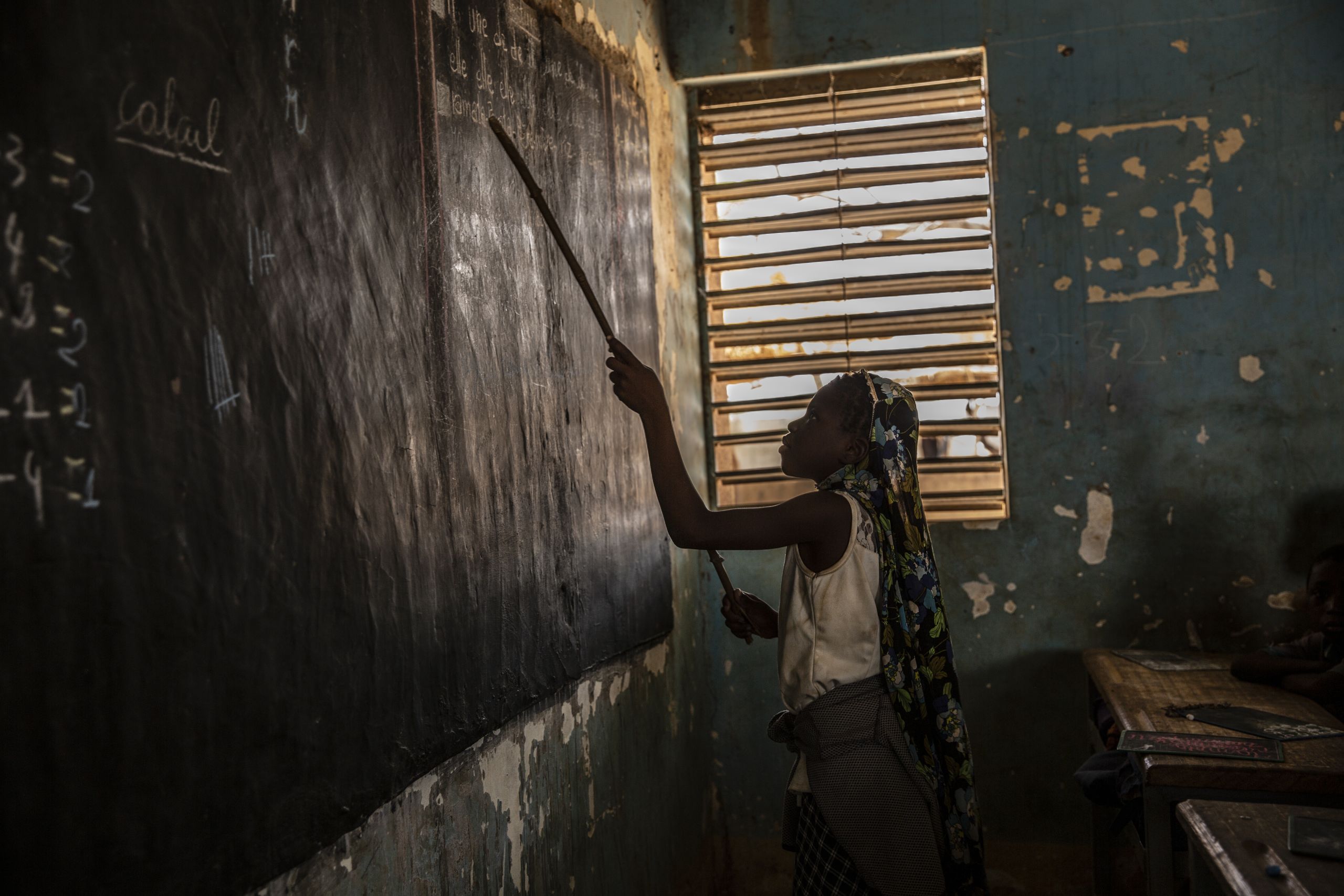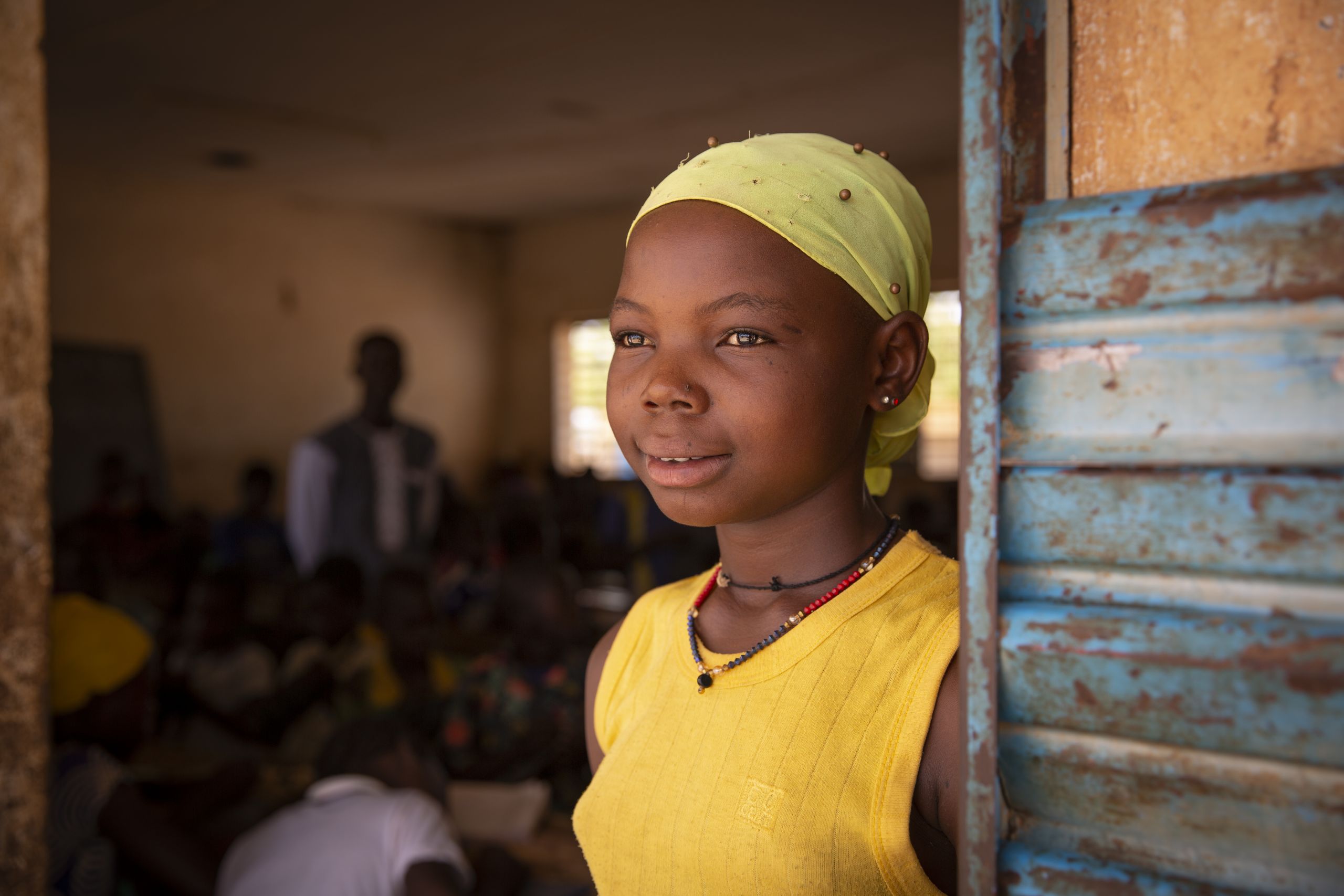Burkina Faso:
The children who fear school

When Saïbata was told she could finally go back to school after a whole year away, she wasn’t thrilled, but scared. For this 12-year-old, school was simply not a safe place to be.
Many children around the world have experienced disruption and anxiety due to Covid-19, a largely invisible enemy. Saïbata’s fears, on the other hand, were of a much tangible kind. When asked if the pandemic caused her year-long gap, the soft-spoken girl shakes her head. “It’s not because of corona. It’s because people were chasing us.”
“It’s not because of corona. It’s because people were chasing us.”
Attacks on schools
From 2016 onwards, violence in northern Mali began to spill into neighbouring Burkina Faso and later spread and intensified. Caught in the crossfire between armed groups, counter-terrorism operations and self-defence forces, over 1.2 million people in Burkina Faso have been pushed out of their homes in the past two years. Displacement on such a scale was unheard of in this landlocked country previously seen as a beacon of stability and peace.
Children, who make up over 60 per cent of the displaced population, have paid a steep price in the violence. The conflict has driven 350,000 children out of school, with Burkina Faso recording the highest number of attacks on education in the Central Sahel region during the period since 2019.
Armed opposition groups have relentlessly targeted schools. They have abducted and killed teachers, torched and looted facilities. They see schools as a symbol of the state they aim to bring down; the embodiment of a type of Western education they despise.
Learning to overcome their fear
Because schools had become such a target, children began to associate them with danger. When a school for displaced children opened last October in Barsalogho, a place where thousands of families had fled for safety, many had mixed feelings about it. Anxieties ran high during the first days of class.

The classroom in action. Photo: Ingebjørg Kårstad/NRC
The headmaster of the school, Hamado Ouedraogo, recalls children running out of the door in fear at the mere sound of motorbikes whizzing by. Armed biker squads descending on communities and terrorising locals had become so common in conflict-stricken parts of the country, that the authorities in some areas banned the use of motorbikes in an attempt to curb the violence.
Whether they had found refuge in Barsalogho months earlier or just a few weeks prior like Saïbata, most of the displaced children were clearly still struggling with memories of sudden attacks and hurried escape – even if they had been in Barsalogho for several months. Many feared it could happen again here, and that school would become once more a hot spot to avoid. Some 675 children were enrolled at the school, but dozens failed to show up at first.

Headmaster of the school, Hamado Ouedraogo. Photo: Ingebjørg Kårstad/NRC
“We didn’t know what to do,” Ouedraogo recalls. “We have the calling to teach, but how do you do that when children are so stressed out and traumatised?”
Teachers knew they first had to learn how to make the kids feel safe. That’s where NRC’s flagship education programme, the Better Learning Programme (BLP), came into play.

The classroom in action. Photo: Ingebjørg Kårstad/NRC
The classroom in action. Photo: Ingebjørg Kårstad/NRC

Headmaster of the school, Hamado Ouedraogo. Photo: Ingebjørg Kårstad/NRC
Headmaster of the school, Hamado Ouedraogo. Photo: Ingebjørg Kårstad/NRC
How the Better Learning Programme (BLP) has helped students bounce back and overcome their fear:
- The pilot programme started this year in Barsalogho and marked BLP’s first introduction in a French-speaking country.
- 34 education staff received training, from school district inspectors to local teachers and education assistants.
- Over 1,600 students benefit from this psychosocial programme on a daily or weekly basis, with calming activities such as breathing exercises and other coping skills being integrated into the regular academic curriculum.
Attendance is high these days, as recorded on this blackboard. Every one of the 82 children in Saïbata’s grade 2 class showed up the day we visited.
“We find they are more attentive in the classroom, and their schoolwork has improved,” says Ouedraogo. “They have overcome their fear. See now, they are playing! They didn’t use to do that. They aren’t afraid anymore. When a vehicle passes by, they glance out, stay put and stay focused.”
Every moment spent in the classroom is precious, as these children have up to three years of catching up to do, Ouedraogo says.
Saïbata, for instance, attends grade 2 despite being 12 years old. During her forced “time out” when her school closed, the young girl spent her mornings selling drinking water at the roadside. She makes a point of stressing that she wasn’t forced to do so. She just had nothing better to do, and her parents let her keep the earnings as pocket money. When asked what she would buy with it, she points at the clothes she is wearing.
Education is critically neglected
Many of the displaced children in Barsalogho feel lucky to have landed in a place where education is available to them, especially as it comes free of charge thanks to the sponsorship of organisations like NRC. Despite the children’s young age, they are fully aware that they are in the minority.
Roughly three out of four displaced children in Burkina Faso do not have access to any education, either formal or informal. After being forced to flee their homes, these children often arrive in places where the schools are overcrowded, understaffed and unable to absorb the influx of newcomers.
The humanitarian response plan in Burkina Faso is critically underfunded for education in particular, with barely 27 per cent of the funds required. Inadequate funding contributes to Burkina Faso being one of the world’s most neglected crises for the second year running.
Read about the world's most neglected displacement crises.
The Norwegian Refugee Council (NRC) is providing assistance to schools such as this one in Barsalogho, but more funding is desperately needed so that more children can attend school.

Parents can’t afford to send their children to school
Nafi Zango, 8, has never stepped foot in a classroom.
She and her family fled to Kaya, a couple of hours drive from Barsalogho. The city of Kaya alone has received over 100,000 displaced over the past couple of years and seen its population double. Humanitarian needs, including in the education sector, have been massive as a result.
Nafi’s dad, Yabyouré Zango, says sending her to school would cost 10,000 West African CFA francs (equivalent to €15) in books and other materials, roughly the amount he struggles to come up with every month to pay rent.

Yabyouré Zango, eight-year-old Nafi’s father. Photo: Ingebjørg Kårstad/NRC
The Zangos’ meagre resources have been depleted over the years due to several forced displacements. Fighting in their hometown of Arbinda drove them to move three years ago before they were uprooted again last year.
“Armed men barged into the village one morning,” says Yabyouré. “We fled to the bush to hide while they torched our house. When they left, we came back to see the damage. There was nothing left to salvage. It had all burnt down. We fled the same day.”

The Zango family. Photo: Ingebjørg Kårstad/NRC
Among the personal items that went up flames were the birth certificates of five of his children. Yabyouré says he would have to pay for duplicates before registering his children in school, adding a new obstacle and an extra cost the family does not have.

Yabyouré Zango, eight-year-old Nafi’s father. Photo: Ingebjørg Kårstad/NRC
Yabyouré Zango, eight-year-old Nafi’s father. Photo: Ingebjørg Kårstad/NRC

The Zango family. Photo: Ingebjørg Kårstad/NRC
The Zango family. Photo: Ingebjørg Kårstad/NRC
A reason to sing every day

For the displaced children in Barsalogho’s classroom, returning home is something they wish for and sing about every day. Originally a call for Burkinabe migrants across the continent to flock back to the homeland, the song has now morphed into a hymn for displaced citizens scattered in their own country.
Saïbata says for now, returning home is just a pipe dream. Whatever her parents might decide, she would not want to leave the newfound sense of safety and purpose that she’s found in her new class.
“I would stay put even if they returned. I want to stay here, in school,” she says.
We must prioritise education
Education has been neglected for far too long in humanitarian responses to conflict and displacement.
NRC refuses to stand idly by and let generations of children suffer as a result. Please support our work to ensure that more children like Saïbata can find their place again, in safe and welcoming schools.

